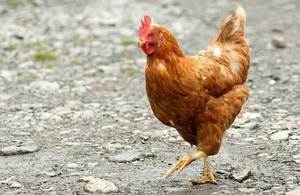Restrictions lifted following the July 2015 case of avian flu in Lancashire
Restrictions have been lifted following a case of avian influenza (bird flu) on a Lancashire farm in July 2015.

hen
Restrictions have now been lifted following an incident of avian flu on a Lancashire farm last month.
The lifting of the restrictions means that all poultry keeping farms within the ten kilometre restriction zone around the infected premises are now allowed to move poultry and other animals without restriction.
The high severity case of avian flu was confirmed in chickens at a farm in Preston on 13 July and robust action was taken to prevent any spread of the disease, which poses a very low risk to human health. A restriction zone was placed around the property.
The restrictions have been lifted 30 days after the completion of an initial cleaning and disinfection of the premises, which is the earliest point allowed under EU rules to end the controls.
Chief Vet Nigel Gibbens said:
Protecting our country from animal disease is vital for our economy. Our robust, swift and intensive approach to tackling this incident, and confirming the disease was contained to a single farm, means we have been able to lift these restrictions at the earliest possible point allowed by EU law.
The UK remains at a constant low risk of an incident of avian influenza and this latest case should serve as a reminder for the poultry industry of the importance of maintaining strict biosecurity to minimise the risk of infection. I also urge keepers to remain vigilant for any signs of disease and report any suspicions to their vet immediately.
Good biosecurity
Good biosecurity measures include:
- strictly limiting and controlling access to poultry flocks
- measures to protect poultry from wild birds, for example preventing wild birds from access to poultry flocks, feed and equipment, and for free range birds, arranging feeding and water so that wild birds are not attracted, and reducing mixing between poultry and wild birds; preventing accumulation of standing water and removing spilled feed that could attract wild birds
- wearing clean overalls and footwear when entering poultry farms: protective clothing and footwear should be removed and either cleansed and disinfected, laundered or disposed of after use
- cleansing and disinfecting all vehicles after each journey to a poultry farm
- having disinfectant and cleaning material ready at farm entrances, so essential visitors can disinfect themselves before entering and leaving premises
- supplying only clean fresh drinking water to birds
- regularly cleaning and maintaining feed bins, hoppers and feeding equipment
- only obtaining feed from a mill or supplier that operates in accordance with relevant Defra, Agricultural Industries Confederation or credible assurance
Further information
Tests confirmed the incident was a high severity H7N7 strain of the disease, it was not linked to the strain found at a Hampshire farm earlier this year.
All poultry on the premises were humanely culled and the affected farm was cleansed and disinfected to prevent the disease spreading.
Investigations suggest the most likely source of infection was direct or indirect contact with infected wild birds. No further cases of Avian Flu have been identified.
Anyone suspecting avian influenza should immediately contact their nearest Animal and Plant and Health Agency (APHA) office.
We have published advice on biosecurity and guidance on avian influenza (bird flu).
Updates to this page
-
Lifting of restrictions.
-
Updated following ending of the Protection Zone at 00:01 on 7 August.
-
Updated following completion of culling activity.
-
A case of H7N7 avian flu has now been confirmed in Lancashire.
-
Added Public Health England and Food Standards Agency links.
-
First published.